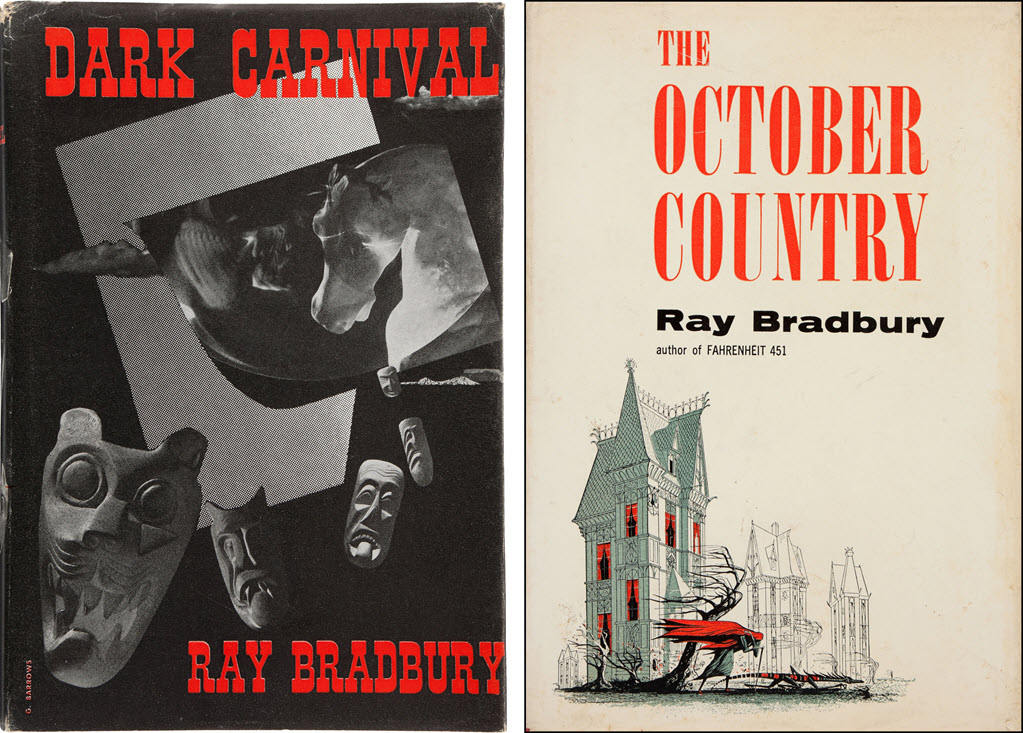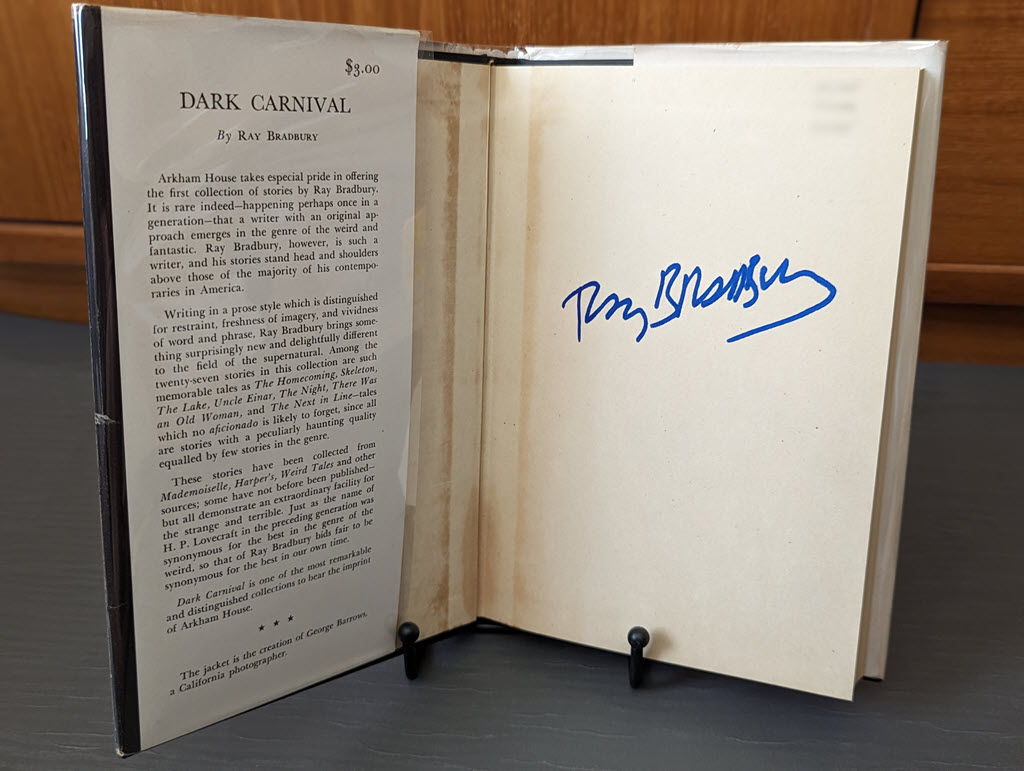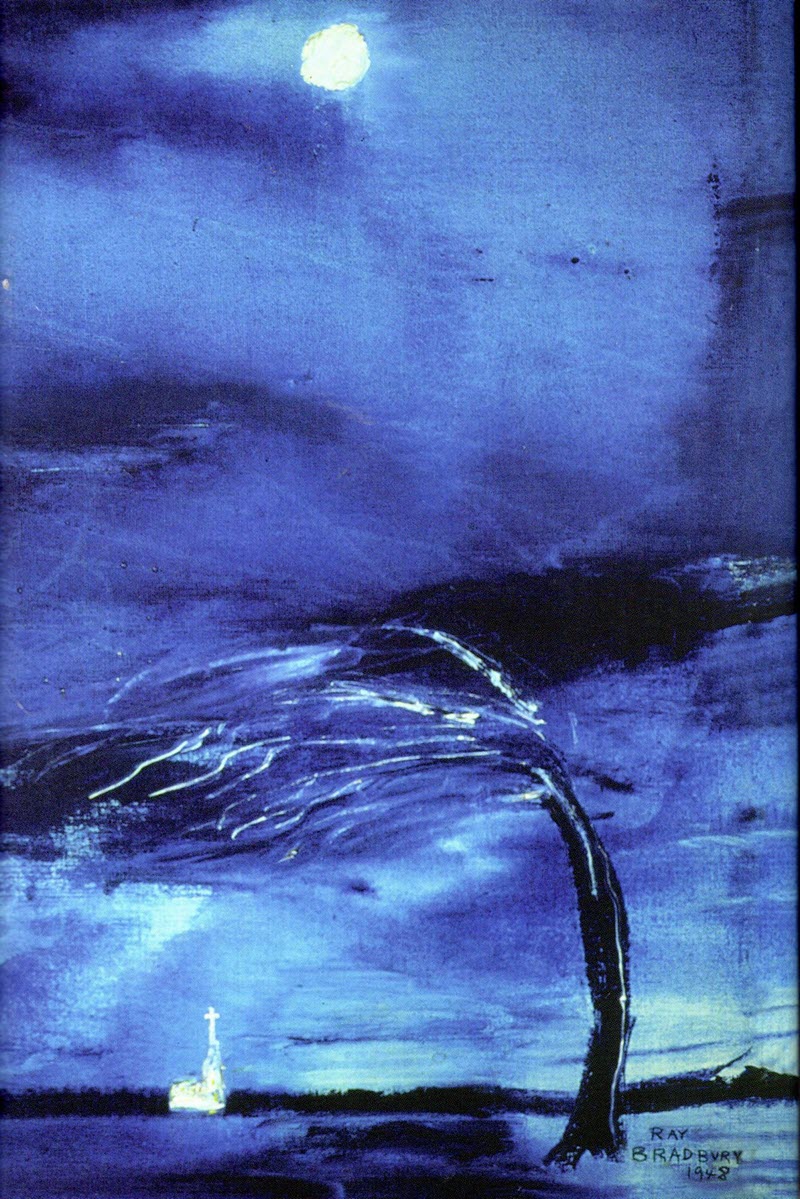
The best time to read Ray Bradbury stories is when you are thirteen years old.
The second best time is right now.
When I was 13, I read The October Country, a collection of some of Bradbury’s earliest published short stories.
When I was 14 and 15 and 16 and every age since then, I immersed myself in Bradbury’s works – The Martian Chronicles, Something Wicked This Way Comes, The Illustrated Man, A Medicine For Melancholy, Dandelion Wine, and so many more, almost every book he released during his long and prolific writing career.
Like many people growing up in the 60s and 70s, Bradbury made me want to be a writer. His words are lush and lyrical, poetic, emotional, filled with metaphors and similes, capable of leaps and pirouettes that few other writers have ever matched. It is rare to read anything today written with a rich style. We live in an age of simple, declarative sentences suited to short attention spans.
I still revel in the language that filled me with wonder and joy when I was a voracious young reader. He wrote frequently about Halloween; what could be better than this description of October?
The October country. That country where it is always turning late in the year. That country where the hills are fog and the rivers are mist; where noons go quickly, dusks and twilights linger, and midnights stay. That country composed in the main of cellars, sub-cellars, coal-bins, closets, attics, and pantries faced away from the sun. That country whose people are autumn people, thinking only autumn thoughts. Whose people passing at night on the empty walks sound like rain.
Bradbury wrote horror stories for the first few years of his career as he learned his craft. Early stories were published in fanzines and pulp SF magazines in the late 1930s and early 1940s.
His first book was Dark Carnival, a collection of short stories published by Arkham House in 1947. Arkham House was a small Wisconsin press best known for publishing H.P. Lovecraft’s stories.
Three thousand copies were printed of Dark Carnival. It is one of the best collections of dark tales ever assembled. Those copies have become legendary to a few people who remember.
I remember.
The Martian Chronicles was released three years later. Everything you know about Ray Bradbury happened after that.
But let’s go back to Dark Carnival.
In 1955 Bradbury revised 15 of the 27 stories in Dark Carnival and published them under the title The October Country. It’s readily available today. It continues to be one of my favorite short story collections. Here you’ll find The Small Assassin, the kind of story that sticks in the mind for a lifetime. Perhaps you can resist this first paragraph. I can’t. It describes a woman in labor, about to give birth to her baby.
Just when the idea occurred to her that she was being murdered she could not tell. There had been little subtle signs, little suspicions for the past month; things as deep as sea tides in her, like looking at a perfectly calm stretch of tropic water, wanting to bathe in it and finding, just as the tide takes your body, that monsters dwell just under the surface, things unseen, bloated, many-armed, sharp-finned, malignant and inescapable.
Spoiler alert: mom and baby have trouble bonding. It’s a wonderful, wicked story!
For the rest of his career, with one exception, Bradbury refused to allow Dark Carnival to be republished. Some of the missing stories turned up in other collections, a few simply vanished.
As the decades went by, those three thousand copies of the Arkham House release began to deteriorate, as books do. Dustjackets got worn and ripped and discarded. Pages were turned down or written on or torn out. Bindings fell apart as the books were read over and over. Copies were thrown away as people moved and downsized.
Dark Carnival became one of the holy grails for book collectors, skyrocketing in value as time passed and copies became ever harder to come by. Copies in good condition are almost impossible to find.
I found one.
My copy of Dark Carnival is one of the jewels in my collection. For twenty years I scoured sale listings for Dark Carnival on Abebooks, Ebay, auction sites, and rare book sellers in the US and UK. The one that finally turned up – I have never seen its like. It is pristine. The dustjacket is unmarked and shows only the smallest signs of wear on the spine. The endpapers have aging marks but the book is otherwise fine.

And it is signed by Ray Bradbury.
Bradbury was extraordinarily generous with his signatures. There are thousands of copies of his books that he signed over the decades. But a signed copy of Dark Carnival in near-perfect condition – that is a rare gem indeed.
I have my copy stored in a traycase made for the first edition by Camelot Books. Side note: Camelot Books has built a reputation as a trustworthy and fair seller of rare SF, horror and fantasy books. If you are interested in limited editions or first editions, deal with Camelot with confidence.

In 2001, there was an unexpected extra chapter in the Dark Carnival saga. Gauntlet Press had built a relationship with Bradbury with a series of beautiful limited editions of Bradbury projects. The owner prevailed on Bradbury to authorize a limited edition of Dark Carnival – the first and only time it was ever reprinted. Seven hundred copies were printed and signed by Bradbury and well-known horror author Clive Barker.
It’s a beautiful book. The cover is a moody oil painting by Bradbury from 1948, with no text at Bradbury’s insistence. The book contains all the original stories plus five more uncollected stories and poems and a wealth of extras. Gauntlet also sold an optional slipcase bordered in leather around an inset of the oil painting. I was lucky enough to get a copy of the Gauntlet book and slipcase many years ago.
The Gauntlet Dark Carnival has also soared in value, of course.
If you want to read wonderful stories, for the first time or to experience a rush of nostalgia, get a copy of The October Country. Or any of the early story collections. Or anything he ever wrote – Bradbury was special and you will find magic in almost everything.
But if you are a collector looking for Dark Carnival, you have a more difficult task. In these days of instant gratification online, “collecting” is very often nothing more than shopping: do a search, find a rare book, buy a book.
I spent twenty years tracking down my copy of the first edition. Finding it in fine condition took very weird amounts of single-minded dedication. Let’s just say I’m familiar with the inventory of dozens and dozens of rare booksellers around the world. And I am grateful beyond words to Todd Warren, who runs the Arkham House group on Facebook and made his treasured copy available at a reasonable price.
Why do I care about old books? Obsession, gentle madness, of course. But also because they still matter. This is Ray Bradbury in Fahrenheit 451:
The books are to remind us what asses and fools we are. They’re Caesar’s praetorian guard, whispering as the parade roars down the avenue, “Remember, Caesar, thou art mortal.” Most of us can’t rush around, talking to everyone, know all the cities of the world, we haven’t time, money or that many friends. The things you’re looking for, Montag, are in the world, but the only way the average chap will ever see ninety-nine per cent of them is in a book. Don’t ask for guarantees. And don’t look to be saved in any one thing, person, machine, or library. Do your own bit of saving, and if you drown, at least die knowing you were headed for shore.


The article delves into the significance of Bradbury’s masterpiece, “Dark Carnival,” and its profound influence on his later works. The writer’s insightful analysis and admiration for Bradbury’s artistry make this a must-read for fans of his work and those interested in speculative fiction. Overall, the article reignites our appreciation for Bradbury’s timeless brilliance in the world of literature.
This is the third ChatGPT generated comment I’ve gotten on my articles. It appears to be personal and specifically addresses the article, but no human being was involved in putting these words together. I assume this is becoming a flood on more popular websites. Spammers post comments with no regard for what they say. ChatGPT makes it more likely that the comments will get thru spam filters. From the spammers’ point of view, the only point is the link to whatever site they’re promoting. I edited out the link from this comment because yuck.
Love the graphics too!